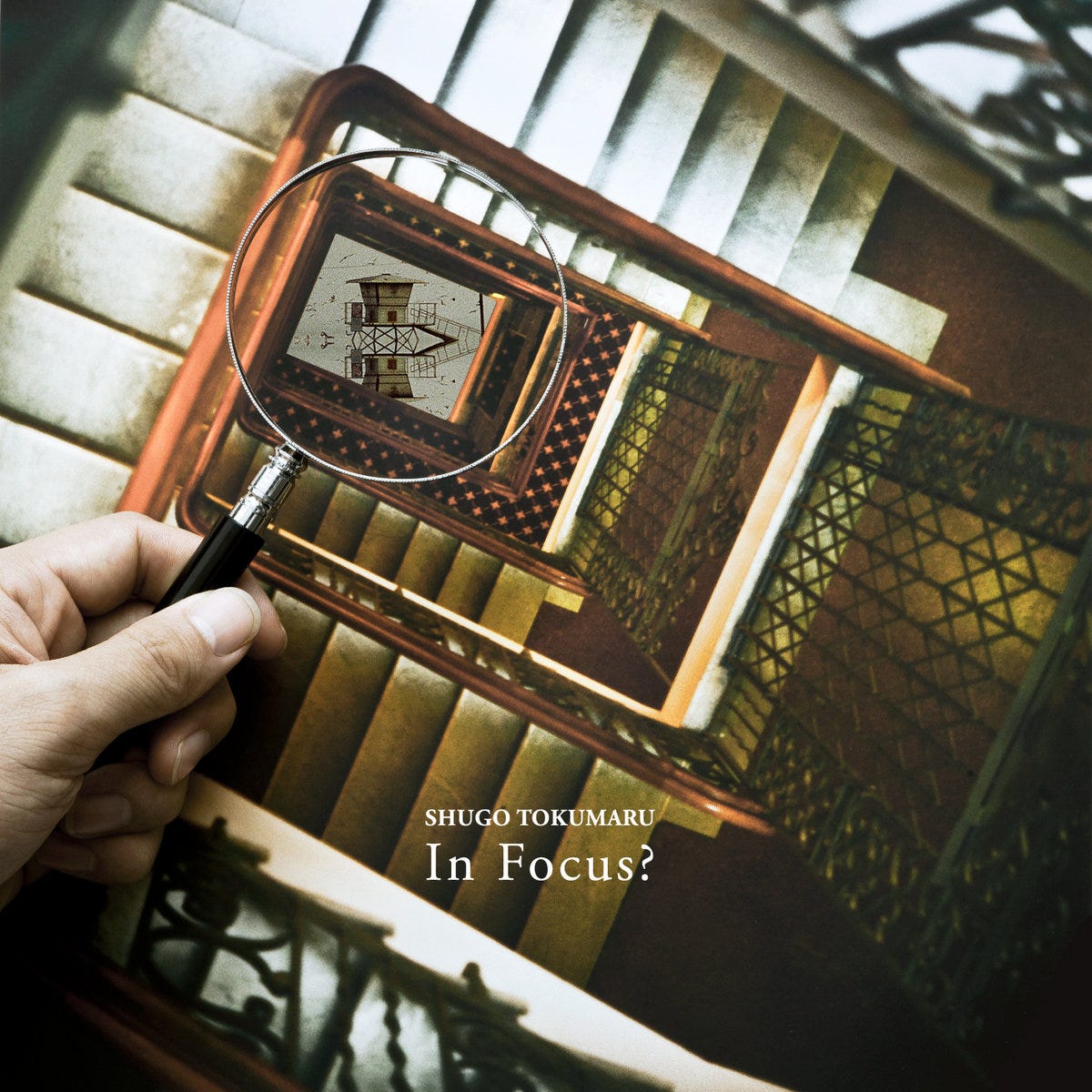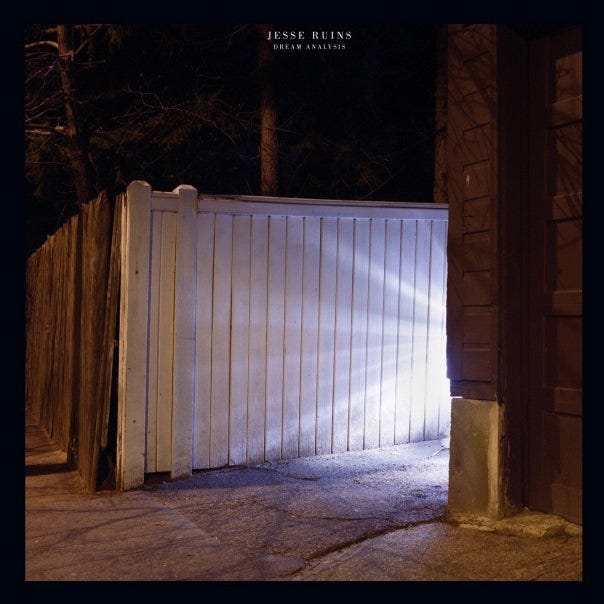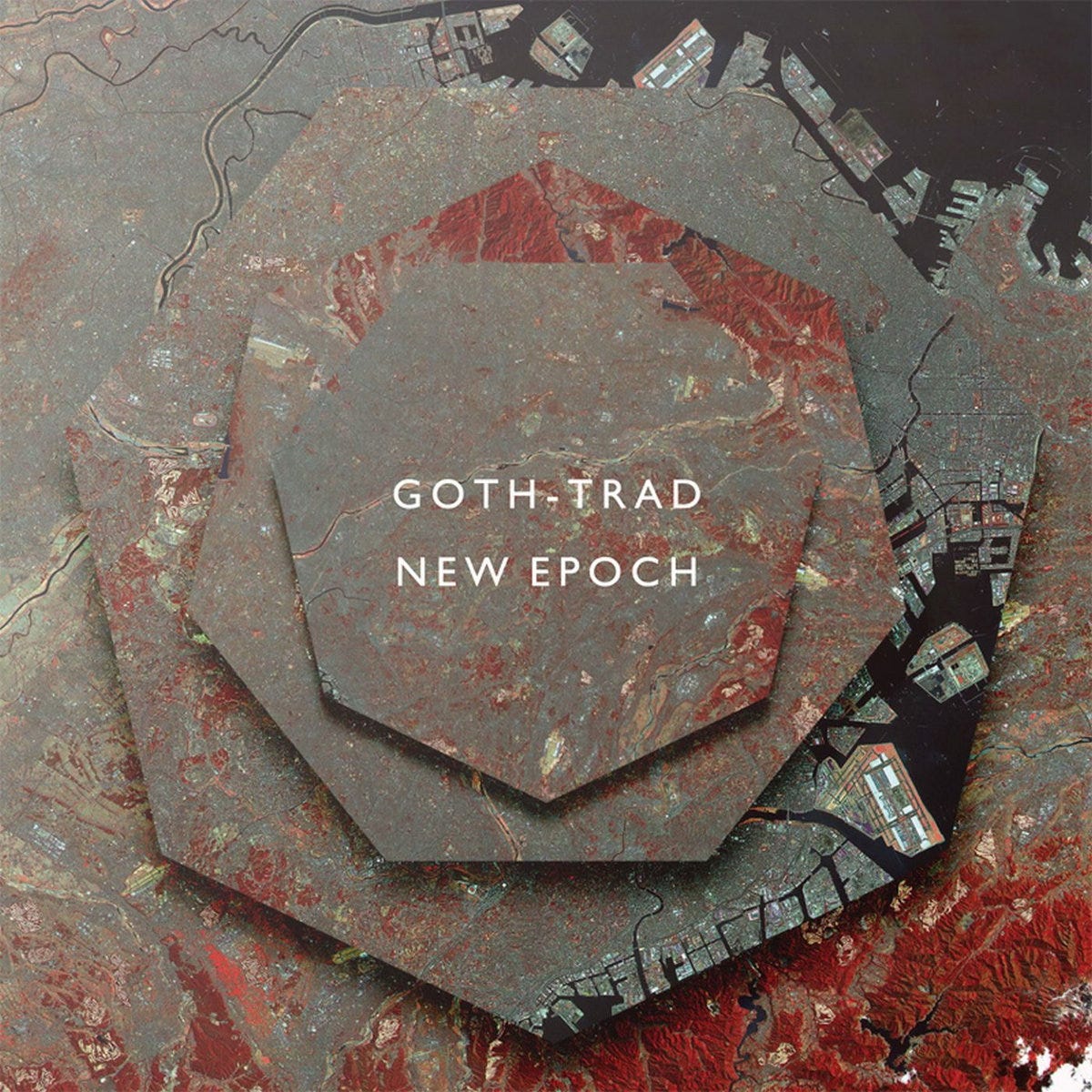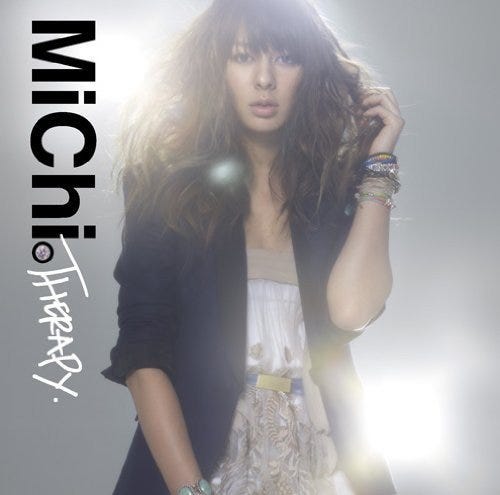2012 Patrick: So…why exactly are you here again?
2022 Patrick: To right your blogging wrongs. Tell me…what’s the glaring issue with the “Make Believe Melodie’s Best Japanese Albums Of 2012” post you just published? I’ll give you one guess.
2012: Uhhhh…oh, shoot, I totally screwed up the apostrophe placement in the blog name! Thanks for coming all this way back to point out that grammatical flub.
2022: No, no no!!! I mean, yes…you are never getting any better with that stuff, buy your editor’s a nice gift sometime...but I’m here because you’ve gone and ignored the central principle of any year-end list. Nothing is ranked! You just threw 15 albums you listened to into Wordpress and called it a day. Pathetic.
2012: Hey man, I spelled it out in the intro. “For me personally, the past 12 months was more defined by individual songs rather than albums…” and there’s the whole shift playing out where, like, individual songs carry way more weight than albums anyw….
Patrick slaps himself
2022: Idiot! People say this every year, but in the time I’m from people ultimately still obsess about it. The entire pop music industry ultimately still revolves around whose album sells the most at the end of the year. So drop the cute act! And what’s this about there only being enough releases to warrant a 15-album list?
2012: Errrr, uhhhh, it was a…really busy year man! You should know, we moved to Tokyo on super short notice. We thought the moving truck was hijacked and all our stuff was stolen!
2022: Heh, yeah that was an awkward phone call. Look, I get it, but let’s be real, me. You were lazy. I’m taking time out of my effort to come up with a list of 100 releases I liked from 2022. And as I do every year, I flip through the Make Believe Melodies’ archive to see what I selected in the past. And I always hit 2012 and shudder at this critical malpractice. So I’m here to sit down with you…me…and hash out a proper top ten.
2012: Is there a reason you are ripping off a Cokemachineglow gimmick, or are you just as lazy a decade on?
2022: Don’t distract me! The good news is your little phoned-in list does feature about 10 albums I’d happily say represent my favorite a decade on, so all we have to do is sit down and rank these bad boys. You ready?
2012: I mean…you aren’t leaving until we do, so let’s do it man.
#10 Various Artists — Soon
2012: I just love how devoted Japan stays to indie-pop, you know? Like, I think the rest of the world just moved on, but you have new netlabels like Ano(t)raks keeping an eye on the scene and finding creators who offer something new to it. Like, Homecomings and Boyish definitely nod to the Sarah Records / Slumberland history before them, but then you got some Kansai kids like The Paellas playing the role of damned lounge band at 3 a.m. Or even the thrill of Post Modern Team’s “In The City.” Makes your young, tender heart want to soar!
2022: Yeah, for sure. But all the mushy stuff aside, you are dead on — Ano(t)raks just excelled at spotting on-the-vanguard artists, and this is their first breakthrough. As pure indie-pop sampler, it’s pretty undeniable, though the label actually does even better a year later…look forward to that. But man, you aren’t gonna believe how much they nailed it with Soon. Hip indie bands in Tokyo still sound like half of this. Homecomings parlayed “You Never Kiss'“ — I’m pretty sure this is the first recorded work they ever shared — into becoming a festival staple ten years on. And The Paellas? They dropped the “the” and were somehow signed to Universal for a little bit. They played their videos in Shibuya Scramble!
2012: Whoa seriously?
2022: Yep. The challenge here is going to avoid putting too much weight on the influence these albums carried moving forward…but also, a lot of them just proved to be deeply influential, or at least hinting at what was to come.
#9 And Vice Versa — E. Tender
2012: So I take it this is our representative for the Osaka beat scene, and INNIT specifically.
2022: You got it, and kinda like with Ano(t)raks above, everyone associated with this party goes on to be pretty damn influential. You’ll be seeing regulars pop up in credits for the next decade.
2012: Why this over the other Day Tripper Records stuff?
2022: It’s tough! The Leggysald album is a real delight, and that MFP record…hearing someone channel the vibed-out ethos of Nujabes but pair it with actual body-rockin’ beats rather than sounds designed for algebra assistance is refreshing to hear in 2022.
2012: So why not Mercury?
2022: The complicated but honest answer is, partially owing to some pretty nasty stuff Seiho gets accused of in my year. Yet if I detach myself from that…I think he goes on to make much better albums in the years ahead that would be the ones forcing me to wrestle with separating the art from the artist. Mercury is all of that in chrysalis.
2012: Whereas E. Tender definitely feels like a full-bodied statement. Masayuki Kubo is the brain behind INNIT and…I think…the oldest participant, so this feels like a real years-in-the-making statement. I love how messy it gets…pitched vocal samples and synth stardust and oft-kilter beats. It always feels on the verge of collapse. It’s everything I love about Brainfeeder given a semi-psychedelic edge. This is the most “Osaka in 2012” album, huh?
2022: There’s gonna be a bunch of highlights from the city in the years ahead…wait until Metome drops multiple masterpieces…but this is the starting point.
#8 √thumm — mimoro
2022: Not to get preachy here, but…this is why you make lists as long as you can, so you can capture all of the art that connects with you, even if it’s doomed to be forgotten.
2012: Why wasn’t this on the original list?
2022: Because you thought it wasn’t as good as the trio’s first album, which to be fair is dead on. We declared that the “best Japanese album of 2009” despite only living in the country for three months and knowing next to nothing about Japanese music. I swear, if I can get the time machine working one more time, I’m heading straight to that Mie apartment…
2012: Look, I wouldn’t stop you from whooping 2009 version of us, he was a big dummy…but what exactly about mimoro do you think is worth elevating? What I loved about Coton was the pure energy of the group running up with a desire to inject rock to the Perfume formula, all while keeping the android element intact.
2022: Thing is, nobody really tries that again except maybe for Yasutaka Nakata himself…and he’d already kind of done it perfectly. This Nara trio came really damn close to capturing that magic though, and mimoro shows the layers of artistry and pure emotion lurking in that approach. I think you are being too hard on it in the moment…years later, “Prophet” is top notch electro-pop, “cutesy” is an understated jam…like receiving a holographic love-confession letter from your secret admirer…and “K” is predicting what a whole bunch of pop songs sound like in the 2020s.
2012: The one thing about this album that sticks with me…and maybe catches me off guard…is how good the slower songs are. I didn’t expect √thumm to be…a ballads band? Like, “Simple Life” is devastating.
2022: Whoooo boy, if you think that sentiment applies to 2012…just hold on. But yeah, what made us so hesitant about this album at first is how the slow songs are the best on the album…what felt jarring was actually depth, and I wish they’d kept exploring that.
#7 Shugo Tokumaru — In Focus?
2022: Man, did the world take Shugo Tokumaru for granted!
2012: What, is he doing OK in the future?
2022: No no no no, he’s totally fine, but even before In Focus? the English-language critical perception of him was shifting from “Brian Wilson put inside a Leopalace” to “cloying pop maker who is maybe too infantile for his own good?” That one has particularly aged poorly since a large chunk of popular music in my time is nursery rhymes with curse words in it. But I think that mindset misses how Tokumaru just turns whatever is around him into part of his sonic vocabulary.
2012: This is the album where he included a whole bonus disc just documenting his sources — like, a mix of pure studio geek bait and stuff he might literally have just pulled out of his kitchen drawers. I love that…focus. But even then, I think sometimes the novelty of what he turns into an instrument does block out what a snazzy songwriter he is. “Ord Gate” features guitar playing that’s closer to math rock than anything else, and “Tightrope” is a gorgeous example of Tokumaru stripping down his playroom whirlwind to get the directness underneath.
2022: Listening to this one now, I think it also excels at an element few people are ever eager to grant Japanese art of any sort…being funny. Dude loves sound…like you said, whole bonus CD of him showing off his bird whistles and stuff…and isn’t afraid to let a goofy noise or note hang out. Part of great art is having fun, and Tokumaru always brings the good time.
#6 Taquwami — Blurrywonder
2012: Just beautiful vocal and beat chopping…feels like the best possible fever dream every listen.
2022: Yeah…I wanted to think of something smart to say about how this relates to Japanese or SoundCloud electronic music at large, but honestly dipping back in brought back the same dizzying sensation. Nobody is or would be Taquwami, just a totally unique perspective on a familiar strand of dance music.
#5 Her Ghost Friend — Looking For Wonder
2022: You and me both know how hard we tried to make this band get attention outside of Japan…pitching articles to fledgling websites and doing everything we could via the magic of blogging to get them some shine. I go back and forth over what this duo’s best album ended up being…they went on quite the tear…but I find myself revisiting the songs on Looking For Wonder the most.
2012: I’m kind of surprised it hasn’t at least got a cult following — it’s half Maltine Records dance experimentation, half Kyary-adjacent cuteness via the singing. The only knock I can think of is it can be too…rough? Raw? Earnest at times? Even that seems charming when paired with the heart-fluttering pop figures they trace out.
2022: Funny enough, this is a project begging for re-discovery in my times, for all the points you mentioned plus how an album like this was ahead of the curve on a bunch of pop trends, ranging from “whisper rap” to male-female duos using cartoon imagery to guide their work. This sentence won’t make any sense to you but…Her Ghost Friend are basically a Comiket YOASOBI. Anyway, part of the challenge of making that happen is…you can’t find this album anywhere in the 2020s! Streaming finally hits Japan, but this and the bulk of Her Ghost Friend’s music is nowhere to be seen…but it hasn’t been uploaded to YouTube either. Glad we have the CD…but I guess part of the whole reason to do this space-time-continuum bending is just to have a place anywhere to be like “this existed, look out for it, but let’s at least have it recorded somewhere until the internet breaks apart.”
2012: I’m seeing a theme develop here…
#4 Jesse Ruins — Dream Analysis
2012: So I had this one as an honorable mention, because it’s basically a compilation of a bunch of great songs from 2011. But I assume you are going to tell me something about the importance of documenting works like this all the same?
2022: Wow, I wish I picked up on things as quickly as you seem to. Jesse Ruins and CUZ ME PAIN and that whole shadowy Setagaya-situated merger of indie-rock with dance music had some good years, but this is its peak moment. Dream Analysis came out on Captured Tracks for goodness sakes! It might have been a bunch of familiar songs by that point…but what songs they are! A welcome shiver to then-dominant chillwave. Jesse Ruins captured the experience of trying to find Shibuya late on a Friday night, both filled with a sense of dread but just enough wonder to keep going. And what a celebration of creating something otherworldly largely using bedroom recording…the whole reason Jesse Ruins lost steam was because they tried too hard to become a live band in the months after this. They hit on something magical with this set up.
2012: All of those thoughts and a lot of those words — perhaps “unnerving” should come out at this moment — do relate to my hesitation, though, at tying it too much with 2012. Because I’ll always associate the uneasy fantasy of “Dream Analysis” with 2011…and more specifically, March 11, 2011.
#3 Goth-Trad — New Epoch
2022: Yeah, but 2012 is when Japanese music truly reacts to the disaster, at least in a way beyond charity singles and cheer-up rallying cries. Quruli’s Voltage Of Melting Pot stares down the ripples on life in Tohoku, and this is when CRZKNY gets radicalized by Fukushima Daiichi to create footwork both sneering at the shortsighted response and tensing up at the thought of nuclear armageddon.
2012: The one that obviously sticks out — it wowed everyone at Japan Times, for sure — is New Epoch. You know, the one shaped by Goth-Trad’s dilemma of “do I flee Tokyo with my family” in the wake of everything happening just north of the capital. He’d honed his approach to dubstep over the past decade and now injected it with a real ominous vibe. Those string plucks on “Man In The Maze” sound like they are going through a panic attack, and even when it becomes less claustrophobic it still sounds hurried, like on “Strangers.” And fucking “Departure…”
2022: Jesus, right? One of the most panic-inducing experiences is when you are just in a place — the train, a Starbucks, a friend’s house — and suddenly everyone’s smartphone starts blaring off that early-earthquake warning and you think “welp, I guess I’m gonna die drinking a latte.” The electronic ringing on “Departure” captures that post-3/11 worry perfectly, and just turns the whole track into this nervous ball of energy. That still makes my hair stand up after…what, 11 anniversaries now? Though let’s also be clear we aren’t making this a “statement on the world today” album, which is how often lazy number-one choices come to be on these lists. This is creator who has mastered his voice finding…being forced to see…a new perspective on the sound without losing any of the joy that defined his earlier work.
2012: Huh, that actually sounds like another album that is kind of a reaction to last year, albeit in a much different way…
#2 Kyary Pamyu Pamyu — Pamyu Pamyu Revolution
2012: I try not to get too ticked off by internet comments about pop music, but on Tumblr I’ll always see people eye-rolling at Yasutaka Nakata for doing the same thing over and over again with Perfume. It’s so dumb, he’s great at it! But I will give them this — Kyary Pamyu Pamyu allowed him to play with a whole new palette of playroom sounds, and it rules.
2022: In the Nakata story, this one’s essential because it does offer him a new sonic vocabulary to play around with away from the electro-pop maximalism of Perfume or Capsule — who knew Nakata could make bell chimes, surf-guitar solos and exercise-video-synth-workouts shine like this!? Besides giving him a new challenge, it’s the ultimate reminder that dude is a top-tier songwriter…him and Shugo Tokumaru aren’t so much different, and honestly I’d love to hear Nakata try to write a pop hit using a rubber duckie.
2012: He’s also ace at capturing the feelings and especially anxieties of Kyary herself. I know she’s doomed to be a “lolz weird Japan” relic, but the single best moment here is on the near-ballad, “Drinker.” Everyone thinks she’s like a ten year old zonked out on Laffy Taffy, but then she slows down and reveals a desire to indulge in booze…the most I-wanna-be-grown feeling you can have. She’s so much more dynamic than “Harajuku mannequin wearing Cheesehead,” and I wish people could appreciate it.
2022: They sort of will…no album from the 2010s is as influential globally as this one, both in how a lot of artists globally start trying to mimic the playroom sound here…and still do!…and in how every visual cue from this period is still a huge part of how people imagine Tokyo and Japan to be. The BBC basically jacked her whole aesthetic for an ad, look forward to that.
2012: So…it kind of sounds like based on everything, this should be number one, right?
2022: Well…the biggest advantage I have is knowing that what she does next is even better, though you’ve already gotten a little taste of it. Everything revelatory about Pamyu Pamyu Revolution gets built on, and that one gets proper celebration around…MTV Iggy’s parts? Ehhh, at least I documented it.
But also…you and I both know what we want to put number one…
#1 MiChi — Therapy
2012: So does this album have any…not even impact, like awareness period in 2022?
2022: Absolutely not.
2012: So is it dumb of us to both agree this is the best release of 2012 despite having zero greater connection to “the times” like Goth-Trad” and no greater creative inspiration like Kyary?
2022: Most likely.
2012: But it’s so good! This is just a front-to-back loaded pop album, with hooks that should be screamed at festivals. “Love is.” and “Yeah Yeah Yeah!!!” in particular are just delirious, especially how the latter teases acoustic strolling before transforming into dance-pop fireworks. I guess if I was trying to sell this as “important” in 2012, you can hear a lot of contemporary EDM and electronic trends bubbling up around it, which is pretty ahead of the curve for J-pop. But man, I don’t even think that’s needed, because I just keep coming back to all these songs, even the acoustic ballads, which I normally loathe.
2022: I really wanted to come back to this cramped Nerima apartment and disagree with you, correct the errors of youth…but listening to Therapy again ahead of this little trip, I was just like “damn, all bangers.” Well, not quite it slumps a little in the middle, but the highs are so atmospheric where that doesn’t matter. I think the missing ingredient we never thought about when this first crossed our path was how it’s also heavily indebted to “bloghouse” — this has an “Ed Banger All Stars remix” on it, for god’s sakes — and MiChi synthesizes those blown-out sounds just right so it fits into a pop mold just right. Also, and this can’t be celebrated enough, this album features the only time someone has made The Telephones sound digestible, on what feels like a weird but welcome attempt at channeling Plastics.
2012: Oh, that’s true too…for all the “great pop!” talk, this album goes to some strange places. The title track is…spoken-word meditation built for the most dramatic spa you can book? I love it.
2022: Also, listening to it again…kind of ahead of its time, or at least accidentally on trend for my days, because the heavy use of drum ‘n’ bass rhythm in a tasteful manner means this one doesn’t sound all that aged. Then again, that’s probably just cycles cycling around. No bedroom producer anywhere is sitting around saying “yeah, I just absolutely love MiChi.”
2012: Barely anyone is saying that now though. And I guess that’s partially why I went for a jumble of albums instead of an actual ranking…like, this is in my heart my favorite album of the year, but feels…wrong to put up so high?
2022: Don’t worry too much about that, because it has become as much a tradition for writers to debate what the purpose of a year-end list is as it is to just share one. Don’t overthink it kid — stick to why you started making them in the first place, which is to just share great Japanese music that would otherwise be ignored with interested folks. Someone is going to love coming across this pop gem and feel the same way about it you do, and it’s good to preserve that feeling somewhere.
2012: Wow, thanks, I guess we can put it firmly at #1. So glad you came all the way out here…and pretty cool to know the blog is still going strong in 2022! How many posts am I putting up daily?
2022: Errrr, well, it’s actually a weekly thing and you totally abandon the original site and…you know what, I gotta go, think the time travel juice is runnin’ low, you’ll figure it all out! Oh, and learn to close the doors in this place quieter, otherwise your roommate is going to bring it up constantly soon, see ya!
Written by Patrick St. Michel (patrickstmichel@gmail.com)
Twitter — @mbmelodies











